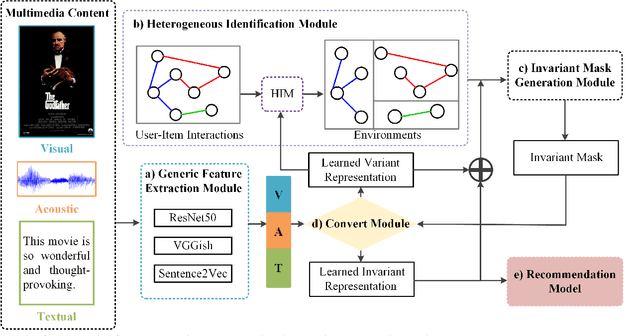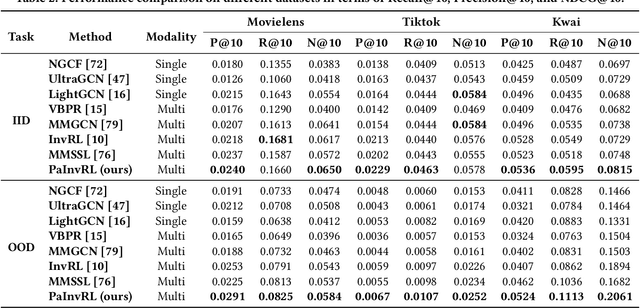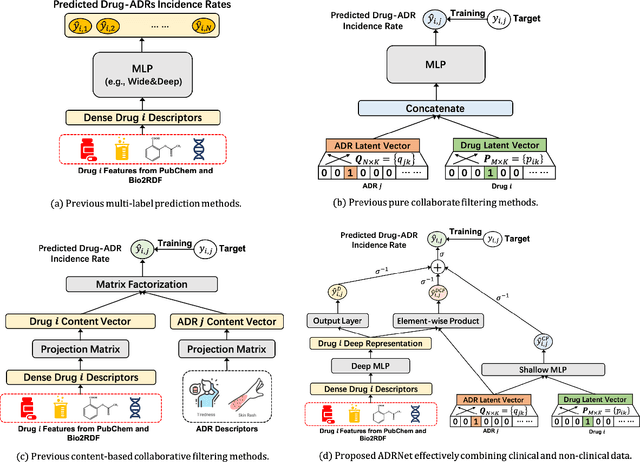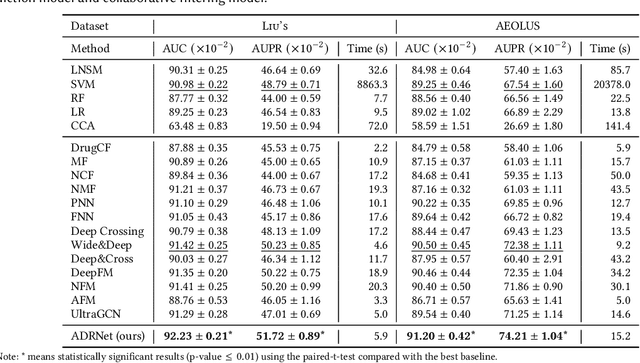Chunyuan Zheng
Detecting Unobserved Confounders: A Kernelized Regression Approach
Jan 01, 2026Abstract:Detecting unobserved confounders is crucial for reliable causal inference in observational studies. Existing methods require either linearity assumptions or multiple heterogeneous environments, limiting applicability to nonlinear single-environment settings. To bridge this gap, we propose Kernel Regression Confounder Detection (KRCD), a novel method for detecting unobserved confounding in nonlinear observational data under single-environment conditions. KRCD leverages reproducing kernel Hilbert spaces to model complex dependencies. By comparing standard and higherorder kernel regressions, we derive a test statistic whose significant deviation from zero indicates unobserved confounding. Theoretically, we prove two key results: First, in infinite samples, regression coefficients coincide if and only if no unobserved confounders exist. Second, finite-sample differences converge to zero-mean Gaussian distributions with tractable variance. Extensive experiments on synthetic benchmarks and the Twins dataset demonstrate that KRCD not only outperforms existing baselines but also achieves superior computational efficiency.
Learning Counterfactual Outcomes Under Rank Preservation
Feb 10, 2025Abstract:Counterfactual inference aims to estimate the counterfactual outcome at the individual level given knowledge of an observed treatment and the factual outcome, with broad applications in fields such as epidemiology, econometrics, and management science. Previous methods rely on a known structural causal model (SCM) or assume the homogeneity of the exogenous variable and strict monotonicity between the outcome and exogenous variable. In this paper, we propose a principled approach for identifying and estimating the counterfactual outcome. We first introduce a simple and intuitive rank preservation assumption to identify the counterfactual outcome without relying on a known structural causal model. Building on this, we propose a novel ideal loss for theoretically unbiased learning of the counterfactual outcome and further develop a kernel-based estimator for its empirical estimation. Our theoretical analysis shows that the rank preservation assumption is not stronger than the homogeneity and strict monotonicity assumptions, and shows that the proposed ideal loss is convex, and the proposed estimator is unbiased. Extensive semi-synthetic and real-world experiments are conducted to demonstrate the effectiveness of the proposed method.
Decomposing and Fusing Intra- and Inter-Sensor Spatio-Temporal Signal for Multi-Sensor Wearable Human Activity Recognition
Jan 19, 2025



Abstract:Wearable Human Activity Recognition (WHAR) is a prominent research area within ubiquitous computing. Multi-sensor synchronous measurement has proven to be more effective for WHAR than using a single sensor. However, existing WHAR methods use shared convolutional kernels for indiscriminate temporal feature extraction across each sensor variable, which fails to effectively capture spatio-temporal relationships of intra-sensor and inter-sensor variables. We propose the DecomposeWHAR model consisting of a decomposition phase and a fusion phase to better model the relationships between modality variables. The decomposition creates high-dimensional representations of each intra-sensor variable through the improved Depth Separable Convolution to capture local temporal features while preserving their unique characteristics. The fusion phase begins by capturing relationships between intra-sensor variables and fusing their features at both the channel and variable levels. Long-range temporal dependencies are modeled using the State Space Model (SSM), and later cross-sensor interactions are dynamically captured through a self-attention mechanism, highlighting inter-sensor spatial correlations. Our model demonstrates superior performance on three widely used WHAR datasets, significantly outperforming state-of-the-art models while maintaining acceptable computational efficiency. Our codes and supplementary materials are available at https://github.com/Anakin2555/DecomposeWHAR.
A Two-Stage Pretraining-Finetuning Framework for Treatment Effect Estimation with Unmeasured Confounding
Jan 15, 2025Abstract:Estimating the conditional average treatment effect (CATE) from observational data plays a crucial role in areas such as e-commerce, healthcare, and economics. Existing studies mainly rely on the strong ignorability assumption that there are no unmeasured confounders, whose presence cannot be tested from observational data and can invalidate any causal conclusion. In contrast, data collected from randomized controlled trials (RCT) do not suffer from confounding, but are usually limited by a small sample size. In this paper, we propose a two-stage pretraining-finetuning (TSPF) framework using both large-scale observational data and small-scale RCT data to estimate the CATE in the presence of unmeasured confounding. In the first stage, a foundational representation of covariates is trained to estimate counterfactual outcomes through large-scale observational data. In the second stage, we propose to train an augmented representation of the covariates, which is concatenated to the foundational representation obtained in the first stage to adjust for the unmeasured confounding. To avoid overfitting caused by the small-scale RCT data in the second stage, we further propose a partial parameter initialization approach, rather than training a separate network. The superiority of our approach is validated on two public datasets with extensive experiments. The code is available at https://github.com/zhouchuanCN/KDD25-TSPF.
Debiased Recommendation with Noisy Feedback
Jun 24, 2024Abstract:Ratings of a user to most items in recommender systems are usually missing not at random (MNAR), largely because users are free to choose which items to rate. To achieve unbiased learning of the prediction model under MNAR data, three typical solutions have been proposed, including error-imputation-based (EIB), inverse-propensity-scoring (IPS), and doubly robust (DR) methods. However, these methods ignore an alternative form of bias caused by the inconsistency between the observed ratings and the users' true preferences, also known as noisy feedback or outcome measurement errors (OME), e.g., due to public opinion or low-quality data collection process. In this work, we study intersectional threats to the unbiased learning of the prediction model from data MNAR and OME in the collected data. First, we design OME-EIB, OME-IPS, and OME-DR estimators, which largely extend the existing estimators to combat OME in real-world recommendation scenarios. Next, we theoretically prove the unbiasedness and generalization bound of the proposed estimators. We further propose an alternate denoising training approach to achieve unbiased learning of the prediction model under MNAR data with OME. Extensive experiments are conducted on three real-world datasets and one semi-synthetic dataset to show the effectiveness of our proposed approaches. The code is available at https://github.com/haoxuanli-pku/KDD24-OME-DR.
Debiased Collaborative Filtering with Kernel-Based Causal Balancing
Apr 30, 2024Abstract:Debiased collaborative filtering aims to learn an unbiased prediction model by removing different biases in observational datasets. To solve this problem, one of the simple and effective methods is based on the propensity score, which adjusts the observational sample distribution to the target one by reweighting observed instances. Ideally, propensity scores should be learned with causal balancing constraints. However, existing methods usually ignore such constraints or implement them with unreasonable approximations, which may affect the accuracy of the learned propensity scores. To bridge this gap, in this paper, we first analyze the gaps between the causal balancing requirements and existing methods such as learning the propensity with cross-entropy loss or manually selecting functions to balance. Inspired by these gaps, we propose to approximate the balancing functions in reproducing kernel Hilbert space and demonstrate that, based on the universal property and representer theorem of kernel functions, the causal balancing constraints can be better satisfied. Meanwhile, we propose an algorithm that adaptively balances the kernel function and theoretically analyze the generalization error bound of our methods. We conduct extensive experiments to demonstrate the effectiveness of our methods, and to promote this research direction, we have released our project at https://github.com/haoxuanli-pku/ICLR24-Kernel-Balancing.
Be Aware of the Neighborhood Effect: Modeling Selection Bias under Interference
Apr 30, 2024Abstract:Selection bias in recommender system arises from the recommendation process of system filtering and the interactive process of user selection. Many previous studies have focused on addressing selection bias to achieve unbiased learning of the prediction model, but ignore the fact that potential outcomes for a given user-item pair may vary with the treatments assigned to other user-item pairs, named neighborhood effect. To fill the gap, this paper formally formulates the neighborhood effect as an interference problem from the perspective of causal inference and introduces a treatment representation to capture the neighborhood effect. On this basis, we propose a novel ideal loss that can be used to deal with selection bias in the presence of neighborhood effect. We further develop two new estimators for estimating the proposed ideal loss. We theoretically establish the connection between the proposed and previous debiasing methods ignoring the neighborhood effect, showing that the proposed methods can achieve unbiased learning when both selection bias and neighborhood effect are present, while the existing methods are biased. Extensive semi-synthetic and real-world experiments are conducted to demonstrate the effectiveness of the proposed methods.
Pareto Invariant Representation Learning for Multimedia Recommendation
Aug 23, 2023



Abstract:Multimedia recommendation involves personalized ranking tasks, where multimedia content is usually represented using a generic encoder. However, these generic representations introduce spurious correlations that fail to reveal users' true preferences. Existing works attempt to alleviate this problem by learning invariant representations, but overlook the balance between independent and identically distributed (IID) and out-of-distribution (OOD) generalization. In this paper, we propose a framework called Pareto Invariant Representation Learning (PaInvRL) to mitigate the impact of spurious correlations from an IID-OOD multi-objective optimization perspective, by learning invariant representations (intrinsic factors that attract user attention) and variant representations (other factors) simultaneously. Specifically, PaInvRL includes three iteratively executed modules: (i) heterogeneous identification module, which identifies the heterogeneous environments to reflect distributional shifts for user-item interactions; (ii) invariant mask generation module, which learns invariant masks based on the Pareto-optimal solutions that minimize the adaptive weighted Invariant Risk Minimization (IRM) and Empirical Risk (ERM) losses; (iii) convert module, which generates both variant representations and item-invariant representations for training a multi-modal recommendation model that mitigates spurious correlations and balances the generalization performance within and cross the environmental distributions. We compare the proposed PaInvRL with state-of-the-art recommendation models on three public multimedia recommendation datasets (Movielens, Tiktok, and Kwai), and the experimental results validate the effectiveness of PaInvRL for both within- and cross-environmental learning.
ADRNet: A Generalized Collaborative Filtering Framework Combining Clinical and Non-Clinical Data for Adverse Drug Reaction Prediction
Aug 03, 2023



Abstract:Adverse drug reaction (ADR) prediction plays a crucial role in both health care and drug discovery for reducing patient mortality and enhancing drug safety. Recently, many studies have been devoted to effectively predict the drug-ADRs incidence rates. However, these methods either did not effectively utilize non-clinical data, i.e., physical, chemical, and biological information about the drug, or did little to establish a link between content-based and pure collaborative filtering during the training phase. In this paper, we first formulate the prediction of multi-label ADRs as a drug-ADR collaborative filtering problem, and to the best of our knowledge, this is the first work to provide extensive benchmark results of previous collaborative filtering methods on two large publicly available clinical datasets. Then, by exploiting the easy accessible drug characteristics from non-clinical data, we propose ADRNet, a generalized collaborative filtering framework combining clinical and non-clinical data for drug-ADR prediction. Specifically, ADRNet has a shallow collaborative filtering module and a deep drug representation module, which can exploit the high-dimensional drug descriptors to further guide the learning of low-dimensional ADR latent embeddings, which incorporates both the benefits of collaborative filtering and representation learning. Extensive experiments are conducted on two publicly available real-world drug-ADR clinical datasets and two non-clinical datasets to demonstrate the accuracy and efficiency of the proposed ADRNet. The code is available at https://github.com/haoxuanli-pku/ADRnet.
Balancing Unobserved Confounding with a Few Unbiased Ratings in Debiased Recommendations
Apr 17, 2023Abstract:Recommender systems are seen as an effective tool to address information overload, but it is widely known that the presence of various biases makes direct training on large-scale observational data result in sub-optimal prediction performance. In contrast, unbiased ratings obtained from randomized controlled trials or A/B tests are considered to be the golden standard, but are costly and small in scale in reality. To exploit both types of data, recent works proposed to use unbiased ratings to correct the parameters of the propensity or imputation models trained on the biased dataset. However, the existing methods fail to obtain accurate predictions in the presence of unobserved confounding or model misspecification. In this paper, we propose a theoretically guaranteed model-agnostic balancing approach that can be applied to any existing debiasing method with the aim of combating unobserved confounding and model misspecification. The proposed approach makes full use of unbiased data by alternatively correcting model parameters learned with biased data, and adaptively learning balance coefficients of biased samples for further debiasing. Extensive real-world experiments are conducted along with the deployment of our proposal on four representative debiasing methods to demonstrate the effectiveness.
* Accepted Paper in WWW'23
 Add to Chrome
Add to Chrome Add to Firefox
Add to Firefox Add to Edge
Add to Edge